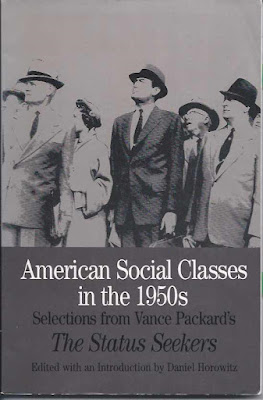Most
of us, whether we’ll admit it or not, have areas of interest that might
surprise a lot of other folks. Where this subject matter comes from is less
important than the depth to which this focus can grasp at and hold tight to our
reflective consciousness. Some people might call them our ‘hot buttons’ or for
others, their ‘touchy subjects’. No matter the moniker, the subject in question
often seems to capture our attention and hold it tight.
I am
guilty of a number of these inquisitive infractions. For whatever reason, I
find my attention drawn to a wide variety of subject matter. ‘Class in our
society’ is certainly one of those areas of interest. In my mind, it ties in
nicely with ‘The American Dream,’ ‘Class Consciousness,’ and (the old favorite
of mine) ‘risin above your raisen.’
Over
the years, I’ve read several books on class. It’s a subject matter that has
long since fascinated me on a very personal level. Perhaps the thin fabric of
my upbringing had a lot to do with it. Growing up, it certainly wasn’t the
glamor of wealth or accumulated material possessions that caught my attention.
Instead, I think it was the place American society had sketched out for me as a
child based on my social, economic, and cultural upbringing.
Both
my grade school and high school slotted me into educational tracks based on my
test scores. My family structure certainly didn’t help advance any educational
chances at success. There were sometimes understood and other times openly
stated assumptions that I would follow a pre-ordained path and certainly never
give any thought to ‘rising above my raisin'.’ My mother and father did just
that. My grandparents the same. That simply was the way it was and always had
been.
One
of the chapters in a recent book about class talked about working class folks
who, usually inadvertently, get a taste of another life outside of their own
realm of existence. The example was a young woman who was taking college
classes at night to get a promotion at work.
What
she found to her amazement was her newfound ability to grasp the material and
delve into it at a deeper level than she ever thought possible. She was
encouraged by her teacher and fellow students to continue her pursuit of
knowledge. But this is where it got complex and ugly.
Her
boyfriend didn’t like the time she was spending in class and not with him. Her
parents worried that she was hanging out with ‘those’ people who would give her
ideas about her own class and status in life. She was treading where few of her
family and relatives had ever gone before. And it made them all very nervous.
‘Educating
Rita’ as a wonderful example of these phenomena. Educating Rita was a 1983
movie starring Michael Caine and Julie Walters. A woman takes night classes at
‘the university’ and finds to her amazement that she has the knowledge and
talent to succeed there. But forces in her life all seem to conspire against
her. Think of this romance/drama as the American Dream without the violins and
background music. Instead you’ll hear the scrapping of fingernails on a
blackboard and the vision of the future that can’t be reached.
Another
good example of this idea is the movie ‘Rudy.’ Based on a true story, ‘Rudy’
does a good job of examining the complex and confusing roles that class places
on folks seeking to break out on their own mold and for those who watch them
leave the fold.
One
of my first novels ‘Love in the A Shau’ painted a picture of just this scenario
with my main protagonist. I also touched on this concept briefly in several
blogs: ‘Damming the Intellectuals’ and ‘Rising above Your Raisin’ as examples of
social and economic crossovers. Another
recent blog entitled: ‘Book of ‘61’ talked about the caste system at my old
high school.
That
caste system (strictly my words and impression only) at Cretin High School was
neither good nor bad, right nor wrong. It was simply recognition by the
administration that some students were better prepared for a college-bound
track of studies than other students. Test scores were the primary indicator of
this placement but I’m willing to bet that socio and economic factors also
played a role in that determination.
Class
is a worn out pathway we are forced to follow until such time that we
consciously select a different route to travel. It is a conscious, and perhaps
at other times, a subconscious decision to follow our heart and head instead of
directional cues from those around us. It might mean leaving behind friends and
family who choose to stay in place.
But
in the end, it is being true to oneself and seeking fulfillment where it means
the most…to you…consequences be damned.











2 comments:
Great comments, Dennis. There's a lot of us from that era. But to most of us, I think that old saying still applies. You can get the child out of the working class, but you never completely get the working class out of the child. And the whole world of work and reward is shifting so much that we tremble for our grandchildren.
Denis, If you haven't already read the book "Caste", I would strongly recommend it. It was December's Rosemount History Book Club's book and was one of our top ranked books by its members. Happy New Year.
Post a Comment